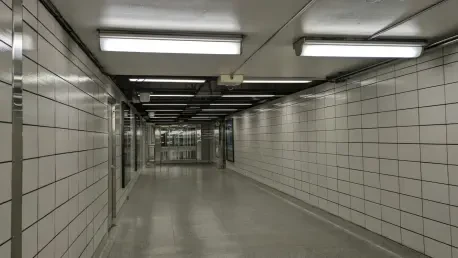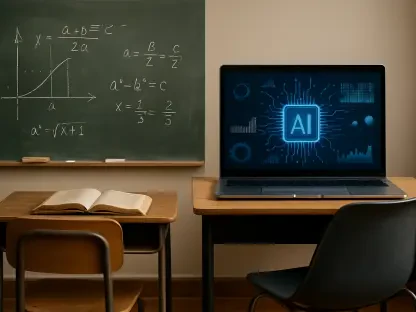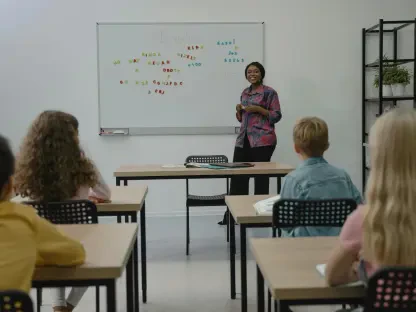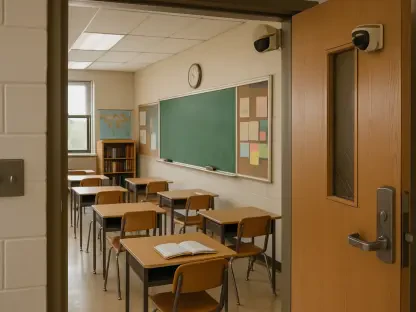As Kharkiv faces ongoing conflict that disrupts daily life, the city’s education sector presses on with remarkable resilience and ingenuity. Since the escalation of hostilities, safety threats have forced schools to radically adapt by shifting classes to subterranean locations. This development emerged as a response to the ubiquitous risks from bombings and air raids, showcasing an unwavering commitment to preserving educational continuity against adversity. The tale of Kharkiv’s underground schools is one of adaptability, illustrating how necessity prompts innovation to uphold the integrity of education.
Innovation in Times of Conflict
Underground Metro Schools
Amidst severe conflict conditions, Kharkiv’s educational institutions spearheaded the creation of metro schools to secure students’ safety without ceasing their academic pursuits. Situated underground in the city’s subway stations, these schools serve as secure, fortified locations that allow approximately 15% of the student population to continue their in-person studies. Mayor Ihor Terekhov reports ongoing construction, expanding these metro schools with four additional locations equipped with multiple classrooms to accommodate increased demand. This move exemplifies the city’s dedication to maintaining educational opportunities despite rigorous challenges.
Stability within metro schools extends beyond physical safety to include the educational resources necessary for modern learning. Despite initial setbacks from equipment theft, initiatives have been implemented to redeploy essential multimedia devices. Efforts focused on replacing stolen items and leveraging international aid have been pivotal. Notably, the Albuquerque Sister Cities program has contributed significantly by donating laptops, enhancing institutional capabilities to provide comprehensive digital learning experiences that mirror conventional educational environments. This partnership underscores the enduring support from communities worldwide committed to Kharkiv’s cause.
Educational Resource Challenges
Resource acquisition remains a formidable challenge for Kharkiv’s education officials amid continuous conflict. Following extensive looting early in the invasion, educational institutions found themselves bereft of computers and multimedia devices imperative for facilitating learning. The absence of resources initially hindered the transition to dynamic underground classrooms, but ongoing remediation efforts aim to restore normalcy. Replacements have been prioritized, although availability remains inconsistent given supply chain disruptions. Notably, international solidarity played a role; organizations like USAID experienced temporary funding discontinuations, yet partnerships such as that with Albuquerque persisted resiliently.
Technological support formed the crux of restoration strategies, with local and international communities emphasizing the necessity of digital tools for students’ academic progression. Albuquerque’s initiatives represent such unwavering support, delivering laptops alongside motivational assurances from Mayor Tim Keller. As technological enhancements reshape academic practices, these contributions signify far-reaching impacts, fostering academic resilience despite surrounding turmoil. While external assistance remains crucial, Kharkiv’s intrinsic motivation underscored by strategic local initiatives ultimately powers the continuity of education amid humanitarian hardships.
Addressing Student Wellbeing
Psychological Impact on Students
The transformation of educational spaces alongside ongoing conflict has unveiled unforeseen challenges impacting student well-being in Kharkiv. Exposure to protracted warfare coupled with the drastic shift in learning environments has affected students’ social dynamics and psychological states. Educators reported changes in classroom interactions, with students becoming increasingly disengaged and socially withdrawn. Director of the Savyntsi Lyceum, Hennadii Kliuyev, conveyed shifts in children’s behavior patterns, attributing them to accumulated stress and psychological barriers obstructing academic engagement. This adjustment period reflects deeper mental health implications integral to enduring such strenuous conditions.
Addressing these psychological impacts involves proactive measures integrating mental health support within educational systems. Initiatives focused on enhancing student interaction, fostering peer relationships, and establishing supportive networks within metro schools are prevalent. Counselors and specialized personnel have been incorporated to provide tailored interventions designed to improve student morale and psychological resilience. This multipronged approach not only targets immediate concerns but aims at building robust coping mechanisms essential in navigating the psychosocial challenges imposed by the wartime setting, preparing students for future adversities with fortified mental strength.
Ensuring Social Connections
Amidst the educational shift enforced by security concerns, maintaining social connections among students emerges as crucial. Professionals recognize that fostering such connections within safe environments enhances emotional stability. Interactive teaching methods and group activities foster experiences that cultivate social bonds imperative for mental health. In this context, educators prioritize adaptive pedagogies, making use of available spaces constructively while nurturing social cohesion among students. The social aspect of education receives heightened attention given its role in shaping holistic development navigated under duress.
Students within metro schools benefit from activities promoting collaboration and team-building, designed strategically to encourage peer engagement in controlled settings. Teachers substitute conventional methods with innovative approaches that emphasize collective critical thinking and problem-solving executed cohesively. This intent underlying educational practices broadens beyond academic competencies, ensuring well-rounded development aligned with future aspirations despite overwhelmingly challenging surroundings. Such comprehensive strategies fortify Kharkiv’s educational ambition, embodying resilience paramount in transforming adversities into opportunities for nurturing adaptable, socially adept youths.
Continuing Educational Efforts
Expansion Amidst Adversity
Kharkiv’s commitment to education amid protracted conflict extends beyond immediate safety to include the expansion of its underground school network. Recognizing the necessity for additional educational capacity, initiatives focused on broadening infrastructure and increasing accessible schooling for all students continue unabated. In nearby towns like Savyntsi, construction projects aimed at establishing more underground institutions reflect broader aspirations dedicated to enhancing educational inclusivity amid adversity. This strategic growth underscores progressive adaptations, striving for environments conducive to both digital and social learning requisites.
Plans for expanding educational resources advocate innovative solutions designed specifically to counter wartime challenges. Schools prioritize safeguarding structures while incorporating comprehensive amenities essential for sustaining immersive learning experiences. In tandem with infrastructure development, digitization remains vital, with digital platforms promoting educational accessibility alongside physical expansions. Such concerted efforts exhibit foresight and commitment, ensuring minimal disruption while equipping Kharkiv’s academic landscape with resources pertinent for enduring the pervasive uncertainties characterizing their reality. These efforts reflect widespread aspirations for uninterrupted educational opportunities.
Safeguarding Educational Values
Kharkiv exemplifies resilience through its unwavering emphasis on upholding the intrinsic value of education amid tumultuous surroundings. Underground schooling initiatives offer tangible benefits surpassing basic refuge, allowing continuous academic advancement integral to students facing perpetual security threats. Proactive steps emphasizing interactive, in-person learning aim at replicating traditional educational experiences within secure confines, underscoring Kharkiv’s devotion to preserving academic excellence while safeguarding children’s well-being amid adversity.
Plans thus encompass long-term ambitions transcending immediate conflict zones, elucidating aspirations for eventual restoration to above-ground schools reflecting everyday familiarity. Strategies hence balance present conditions with future objectives, enhancing academic integrity among students subjected to extraordinary circumstances. Community alliances bolstered by international partnerships emphasize this collective resilience, underscoring determined pursuits aimed at ensuring educational stability characteristically distinct to Kharkiv’s perseverance.
Conclusion
Kharkiv, amid ongoing conflict and daily disruptions, showcases a remarkable story of resilience and creativity in its education sector. As the hostilities increased, threats to safety forced schools to innovate by moving classes underground. This shift was a necessary response to constant dangers from bombings and air raids, reflecting an unwavering dedication to maintaining educational continuity in the face of adversity. The transformation of Kharkiv’s schools into underground learning environments is a testament to adaptability and courage, emphasizing how necessity drives innovation. This approach not only highlights the commitment of educators and students to persevere but also illustrates the broader human spirit’s determination to overcome obstacles and preserve the essence of learning, regardless of circumstances. In these challenging times, Kharkiv’s underground schools serve as symbols of the power of innovation and the relentless pursuit of knowledge above all, proving that education can endure even in the harshest conditions.









